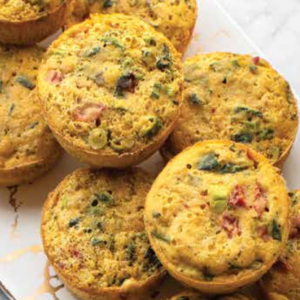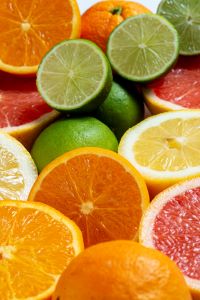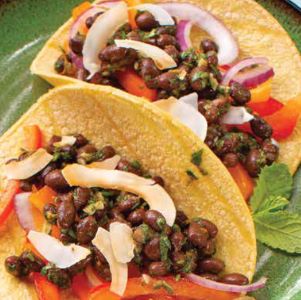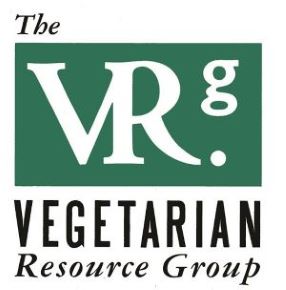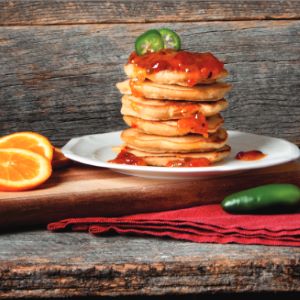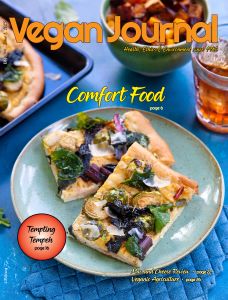Posted on
January 02, 2025 by
The VRG Blog Editor
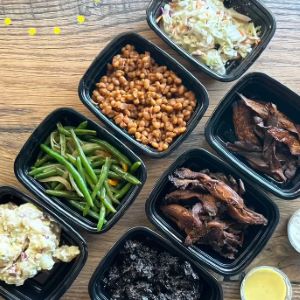
photo from Swap Out The Swine
The Vegetarian Resource Group maintains an online Guide to Vegan/Vegetarian Restaurants in the USA and Canada. Here are some recent vegan restaurant additions. The entire guide can be found here: www.vrg.org/restaurant
To support the updating of this online restaurant guide, please donate at: www.vrg.org/donate
Here are some new additions to VRG’s guide:
BOOMCHIA, The Madison Building, 427 Bloomfield Ave., Ste. 101, Montclair, NJ 07042
BOOMCHIA’s “magic in a bowl” was enough to earn this superfoods café a place in Yelp’s Top 100 Places to Eat in the U.S. for 2024. What is also magical is that their menu is fully customizable, with no additional charges for extra bases or toppings—options are unlimited as long as it all fits in the bowl (with small, medium, and large bowls available). Bases include the traditional acai and pitaya, as well as more exotic options like matcha, blue coconut (coconut with blue spirulina), and BOOMCHIA pudding (chia pudding with blue spirulina). There are four types of granola to choose from, including a gluten-free dark chocolate granola made with oats and quinoa. The next options to layer include fruit; toppings like sunflower seeds, toasted coconut, cacao nibs, and Goji berries; nut butters (almond, peanut, dark chocolate almond, and sunflower), and syrups and powders. If you can’t decide between the date honey and the apple honey, or between the espresso powder and the maca powder, add them all—or come back the next day to try a new combination! Other menu options include snack-sized grab & go BOOMCHIA puddings; Paper Plane Coffee Company cold brew; and Kombucha on tap.
Brekkie Bowls, 100 Wailea Ike Dr. #4, Wailea, HI 96753
A cute, leisurely food trailer specializing in build-your-own breakfast bowls and smoothies. Some popular menu options include the Half Açai Half Pitaya Bowl and the Açai Dragonfruit Superfood Bowl, which both feature generous helpings of fresh fruit. If you’re in the mood for something to drink, then the cold brew coffee or the kombucha might be up your alley.
DurVo, 5255 S. Decatur Blvd. #107, Las Vegas, NV 89118
Amidst the hustle and bustle of Las Vegas, DurVo offers an elevated vegan dining experience—an escape from the more typical Vegas eateries. With a classy, elegant décor, DurVo’s fusion menu offers options such as crab cakes made from jackfruit and served with a celery slaw and pistachio pesto rigatoni. For a spicier entrée, try the Indian coconut curry served with tofu and white rice. Whether you’re on a date night or not, it will be hard to resist their Three Layers of Love dessert, which is made with a top layer of matcha mousse, a middle layer of mango ganache, and a bottom layer of walnut ice cream. Whether you are a local resident or just in town for the weekend, giving DurVo a try is probably the best bet you can make in Vegas.
Le Basque, 15 Union Square West, New York, NY 10003
Aiming to braid classic techniques with creative innovation focused on seasonality, Le Basque fuses French and Spanish cuisine with plant-based flare. Pintxos (Northern Spain’s word for small snacks) include Mint Grilled “Lamb” with cumin, asparagus purée, and pistachio mint crust; Wild Mushroom showcasing Chanterelle, oyster, wood ear, crimini, and hen of the woods mushrooms, tarragon porcini cream and aged balsamic; or Chorizo with Ñora chili flakes, smoked pepper “goat” cheese, pickled fennel, apples, black olives, and dill. Ready to begin in earnest? For Starters, there are Faux Gras made with smoked lentils, sage infused butter, white wine, poached apples, and toasted sourdough; lemon cured Saffron “Tuna” Crudo with citrus marinade, pickled fennel, chervil, nasturtium, and shaved marcona almonds; or Escargot—Wood ear mushrooms, shallots, parsley, butter, garlic, gruyere with toasted baguette, and more. A sampling of several Entrée choices include Port Beef Bourguignon—Braised “beef,” port wine sauce, carrots, pearl onions, crimini mushrooms, and Yukon potatoes; Mushroom Paella with Bomba rice, chorizo, king oyster and chanterelle mushrooms, saffron, white wine, and dulse flakes; or Blue Oyster Mushroom Steak with smoked lemon orzo, grilled asparagus, red wine gastrique, and spring onions. Some of the Desserts are Entremet aux Noisettes—Hazelnut mousse, chocolate cake and salted fig caramel, or “Le Basque” Cheesecake with Quince Chantilly, wild berry lavender compote, and raspberry tuile.
Starving Vegan, 1865 Flatbush Ave., Brooklyn, NY 11210
Hungry for a plant-based menu with Asian and Latin American influences? Appetizers feature lots of Empanadas (Mushroom, Jerk Mushroom, Chick’n, and Beef), Battered Broccoli, and more. There are Yellow Split Pea and Lentil Soups. Patties include Kale, Lentil, and Chick’n. Some of the many Dinner entrées are Honey BBQ Mushroom Burger; Spinach or Tomato and Basil Burrito filled with your choice of Chicken, Fish, or Mushroom, and rice, beans, lettuce, red cabbage, tomato, red onions, Bell peppers, carrots, and House Sauce; Citrus Chick’n—soy protein in sweet, tangy sauce; Curry Fish soy protein in curry sauce; Tofu Sautéed with Spinach and Carrot in curry sauce; or Sesame Chick’n with white rice and broccoli. Most Dinner entrées come with your choice of Sides: Rice and Peas, Veggie Rice, String Beans with Carrot, Steamed Mix Veggies, Fried Plantains, Salad, Potato Salad, Callaloo and Okra Mix, Stew Peas, Chick-peas and Chana, or Spinach or Macaroni Salad. For Dessert there’s Banana Bread, Carrot Cake, Red Velvet, and more.
Swap Out the Swine, 5604 York Rd., Baltimore, MD 21212
Keeping pigs safe, one plate at a time! Many dishes are listed gluten-free. They offer scratch-made sides including Smoky Baked Beans slow cooked in a slightly tanged hickory sauce; Ginger Glazed Whole Green Beans sautéed with soy, sweet onions, and bell peppers; and Miss Pat’s Vegan Potato Salad. Some platters are Chicken Shrooms, mesquite smoked, dry rubbed chicken fingers–choose “noney” mustard or ranch dipping sauce; Shroomacon BLT crispy mushroom bacon with salad fixings on country white or whole grain bread; and Pulled Mushroom Sandwich showcasing BBQ pulled shrooms on a vegan brioche with fresh coleslaw.
The Lemon Tree, 395 Ontario St. A1, St. Catharines, ON L2N 7N6 Canada
The Lemon Tree Bistro serves vegan Mediterranean and Italian food. Appetizers include deep-fried “calamari” made with breaded root vegetable and served with tzatziki sauce; bruschetta topped with house-made feta; and a hot mezze platter with coconut shrimp, “calamari”, “steak” bites, and falafel. The lunch menu includes vegan chicken and falafel wraps as well as a crispy eggplant sandwich topped with roasted red peppers, spicy feta, and melted mozzarella. The dinner menu includes a vegan steak dinner of grilled steak, sautéed mushrooms, and grilled asparagus; lasagna with layers of pasta, alfredo sauce, marinara, and cheese; stuffed portobello topped with artichoke and spinach dip; and a pickle pizza topped with sliced pickles and cheese.


